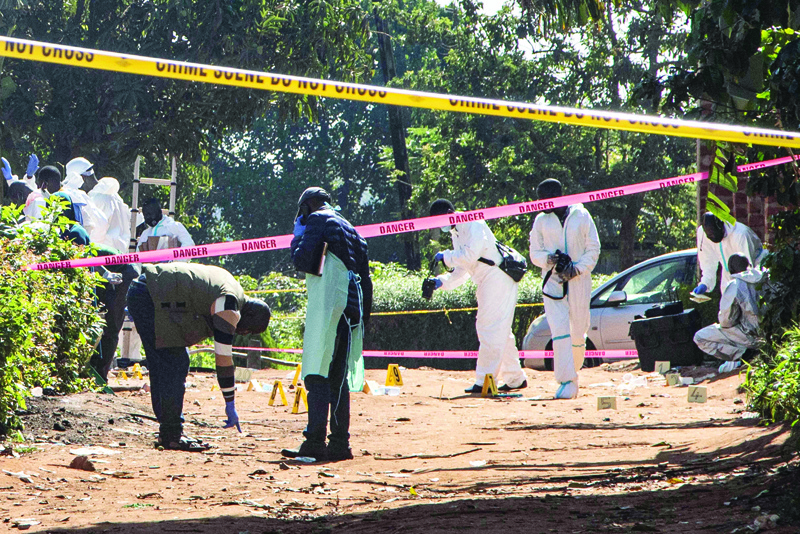KAMPALA: Ugandan President Yoweri Museveni said yesterday an explosion in the capital Kampala that killed one person and injured five was "a terrorist act", vowing to hunt down those responsible. Police said a "serious blast" occurred at around 9 pm on Saturday at a grilled pork joint in Komamboga, a northern Kampala suburb popular with roadside diners. Museveni said he had been briefed that three people left a plastic shopping bag at the scene that later exploded, killing one person and injuring five others.
"It seems to be a terrorist act but we shall get the perpetrators," Museveni said on Twitter. He said investigators were still combing the bomb site and more details would be released later, including advice for the public about "dealing with these possible terrorists". "The public should not fear, we shall defeat this criminality like we have defeated all the other criminality committed by the pigs who don't respect life," Museveni said.
Masked anti-terrorism police dressed in black fatigues held journalists and members of the public several hundred meters back from the blast site yesterday. Police forensic officers in white overalls could be seen examining areas close to the scene. The explosion occurred about two hours after the start of a nationwide dusk-to-dawn coronavirus curfew. Security forces rushed to the scene in Komamboga, a fast-growing suburb about eight kilometers north of Kampala city centre.
Roadside eateries with plastic furniture cater to local residents there, particularly young professionals moving into newly-constructed apartment buildings in the once-rural area. Local mayor Emmanuel Sserunjogi said the bombing took place in an area popular with revellers looking for roasted meat and drinks on a night out. "The community are frightened. It was such a terrible act. People were woken up by the sound of the bomb," he told AFP.
Terror warnings
It is the first such deadly attack in many years in Kampala, a bustling city on the shores of Lake Victoria. But it followed an uptick in recent weeks of signs and warnings that a strike could be imminent. On October 8, the Islamic State group claimed its first attack in Uganda, an alleged bombing of a police post in the Kawempe area, near where Saturday's explosion occurred.
In a statement issued through its communication channels, the group claimed a unit from its Central Africa operation had detonated an improvised explosive device that resulted in injuries and damage to police infrastructure. No explosion or any injuries were reported by authorities or local media at the time, though police later confirmed a minor incident had occurred without providing further details. However in the following days, both the UK and France updated their travel advice for Uganda, urging vigilance in crowded areas and public places like restaurants, bars and hotels.
"Terrorists are very likely to try to carry out attacks in Uganda. Attacks could be indiscriminate, including in places visited by foreigners," stated the updated advice from the UK. In 2010, twin bombings in Kampala targeting fans watching the World Cup final left 76 people dead. Somalia's Al-Shabaab militant group claimed responsibility for the blasts at a restaurant and at a rugby club. The attack, the first outside Somalia by the insurgents, was seen as revenge for Uganda sending troops to the war-torn country as part of an African Union mission to confront Al-Shabaab. - AFP



